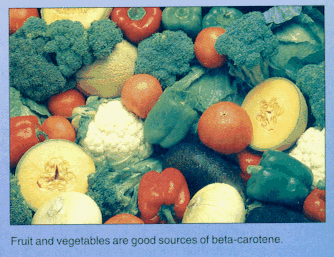
BETA-CAROTENE AND GOOD HEALTH
The yellow compound that gives carrots their color is called beta-carotene. The body can transform this compound into vitamin A. The connection between "eating your carrots" and having healthy vision has been understood for a number of years; vitamin A is essential for good vision. Other good sources of beta-carotene are spinach and other dark leafy greens, broccoli, deep orange fruits (apricots and cantaloupe), and other yellow vegetables (squash, sweet potatoes, pumpkin).

Not only does beta-carotene function in the body as a source of vitamin A, it also has roles of its own. Beta-carotene is believed to protect body tissues from harmful oxidation reactions.
Numerous animal studies have shown that beta-carotene provides protection against cancer. The protection varies, depending on a number of variables, such as the types of animals used, the experimental conditions, and the types of cancer studied. Research along the same lines involving human cancer also has produced varied results. Dietary fruits and vegetables that contain beta-carotene seem to diminish the incidence of some types of human cancer. However, the use of beta-carotene in food supplements has not always given similar protection. Until such protection is demonstrated for supplements, the best source of beta-carotene would seem to be generous servings of appropriate fruits and vegetables in the diet.
